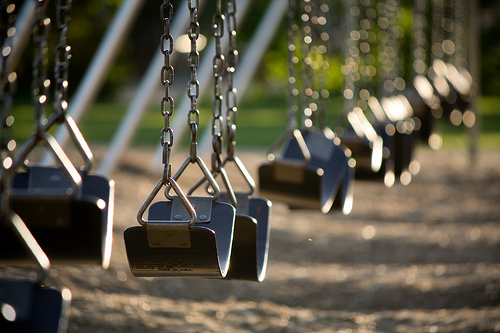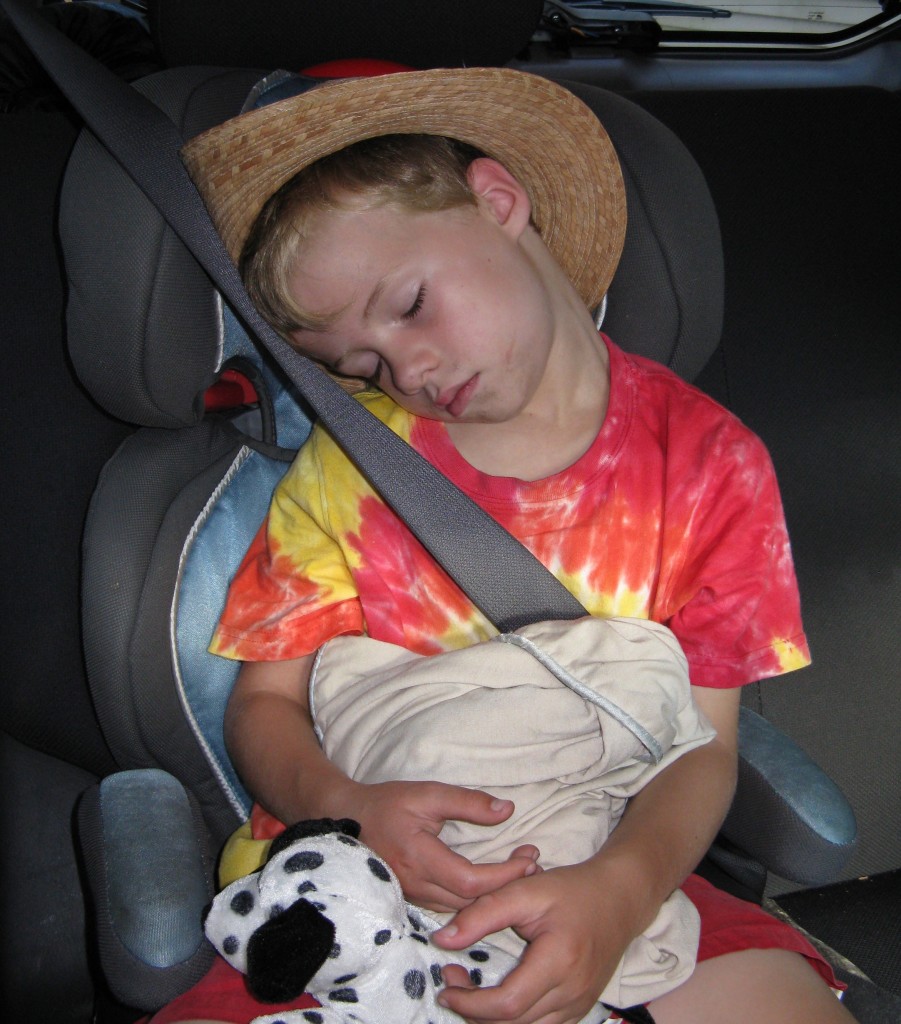A World of Books and Children
Search and enjoy 8 years of posts chock-filled with ideas from It’s OK Not to Share and beyond.
First, thank you to the folks who have read my controversial post "Why we say "No" to Homework." I must admit, I was blown away by the thousands upon thousands who read that post.
Many of you have asked excellent follow-up questions, but since there were so many of them I didn't know how to respond at first. Now I know. I'm incorporating "Homework" as a major topic in my next renegade parenting book. Meanwhile, I'll answer one of your burning questions here.
What happened after our family wrote the "we ban homework" letter?
The letter sparked a good conversation with my son's third grade teacher. We talked about how we supported his education at home. We talked about her goals for the class and her goals for him. We agreed to no homework and that it was still his responsibility to master what kids were learning in class. Thanks to her flexibility and understanding of individual needs, the year went by without a glitch.
It seems more teachers are willing to be flexible in the younger years, especially if parents show they care and are involved. My child's first and second grade teachers also agreed to no homework for our family, but each year the pressure increased. This school, on the whole, believed in homework for elementary students and had the common "10 minutes a grade" policy. By 4th and 5th grade homework was expected to be 40-50 minutes long each night (though many families will attest it took much longer) and became more serious. We were heading into a true clash of education cultures.
So last year we changed schools. This is difficult in our small town because there aren't a lot of options. We now send both our kids to a charter school that basically has no homework until middle school. They encourage reading every night at home.
The individual approach -- the "no homework" letter -- is a difficult path that gets harder as children grow older. What really needs to happen is mass change and education of educators. For my next book, I'm digging into research that shows that there is no evidence that homework at the elementary school age helps at all. Many scholars dispute its worth at the middle school level, either, and that any homework over two hours a night for high school has a diminishing return.
So it's a happy ending for us. My son is in 5th grade now and tells anyone who will listen that he goes to a "really cool school!" But the problem is immense. Every day people find my blog by typing pleas on the internet like this: "my 7-year-old is in tears with three hours of homework" "homework is ruining my family" and "it's past 10pm and my 4th grader is still working on homework."
What's your update? For those of you who have tried to buck the homework system, what was the result? I'd love to hear from you.
What happened? Did it work for you? What's your homework story?
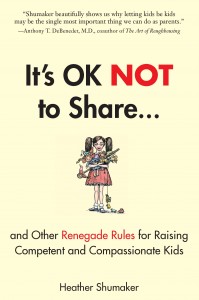 Heather Shumaker is the author of It's OK Not to Share and It's OK to Go Up the Slide (published 2016) If you're interested in alternatives to a homework culture in elementary school, pick up a copy of It's OK to Go Up the Slide.
Heather Shumaker is the author of It's OK Not to Share and It's OK to Go Up the Slide (published 2016) If you're interested in alternatives to a homework culture in elementary school, pick up a copy of It's OK to Go Up the Slide.
What if you heard a teacher say: "Your assignment is late. You can't eat lunch today."
Preposterous, we say. Lunch is essential for giving kids energy. It boosts brain power, helps focus and concentration, and gives kids a social break. So does recess.
More than 30% of U.S. schools have little or no recess. For schools with scheduled recess time, teachers commonly hold recess over kids' heads as a disciplinary threat. Restless behavior? No recess. Late homework? No recess. Missing parent signature on reading log? No recess. Didn't finish a class assignment on time? Stay in for recess to finish it.
Recess should never be taken away for any reason. Recess is as essential as lunch.
Cognitive work (school work) takes enormous amounts of concentration and mental energy. Recess restores it. Simply looking at academics, recess is vital to improve memory, learning, concentration, creativity, problem-solving and other executive functions. Recess also refreshes the spirit, it improves children's attitude toward school, and gives them an emotional and social break. It's a chance to see friends and do your own thing. Recess is break from being told what to do all day.
The American Academy of Pediatrics says in its 2013 policy report that "recess is a crucial and necessary component of child's development and...should not be withheld for punitive or academic reasons."
Like other forms of corporal punishment, depriving kids of recess is a misguided practice that has to go. Yes, recess deprivation is corporal punishment. "Corporal" = of or relating to the body, and "corporal punishment" includes physical imprisonment.
Can teachers manage without this particular management tool? I have confidence they can. Teachers once thought they couldn't manage their classes without swatting kids with wooden boards. Bad practices seem convenient at the time, but they have no place in quality education.
Taking away recess - whether by schedule or as punishment - deprives kids of the chance to learn at the best of their abilities.
Besides, those restless kids? Their bodies are telling us a simple message: we need recess the most.
Find out if your child's school has a protection policy about withholding recess. If not, try addressing the issue with the classroom teacher with a preventative note:
Dear [teacher's name],
We feel strongly that recess is an essential part of the school day for optimal learning. The American Academy of Pediatrics recommends that no child should be deprived of recess time for any reason (behavior, missing classwork or any other). If you need to discipline [child's name], please do so in a way that does not compromise recess. We're happy to discuss this more with you at any time that's convenient. We'd like to do whatever we can to support you in the classroom. Thank you for all you do for the students.
Sincerely, [your name]
Need help? Get a copy of It's OK to Go Up the Slide, which dives into recess and other vital topics for happy kids.
Has your child ever been deprived of recess? What was the cause? What other methods work well for educators?
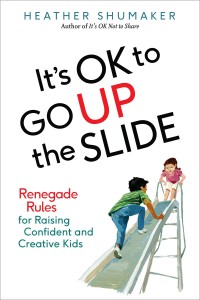 Heather Shumaker is the author of It's OK to Go Up the Slide. THE book for hot topics like recess, recess advocacy and homework. If your school or child needs recess help, get a copy of It's OK to Go Up the Slide.
Heather Shumaker is the author of It's OK to Go Up the Slide. THE book for hot topics like recess, recess advocacy and homework. If your school or child needs recess help, get a copy of It's OK to Go Up the Slide.
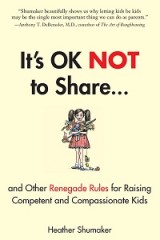 Heather Shumaker is also the author of It's OK Not to Share.
Heather Shumaker is also the author of It's OK Not to Share.
Essential reading for anyone with preschool-aged children who have big emotions, creative ideas and active energy.
If you have a new kindergartener, perhaps this scene happens in your family: Sudden crash when you get home. Screams. Tears. Droops. Falling asleep in the car or on the sofa. You know something's not right. What is it?
Kindergarten Crash. It's an extreme message that something's not right. Listen.
Last year I sent my youngest off to kindergarten. He was the first one in the family to go to all-day, every day kindergarten, and he rebelled with every inch of his 5-year-old little body. The long day wiped him out. When I picked him up from the bus he collapsed on the sidewalk, shrieked and dissolved in tears. At home, he had no energy to play. He just sat in a chair and stared, day after day, his toy pirates untouched.
He fell asleep for the night at 5pm.
Kids across the city I knew in other schools had the same reaction. One girl fell asleep in her car seat at 4:30pm. Another girl cried in the parking lot and screamed when she came home. Another kindergartener cried every day before school for 8 weeks. These are signs of kids showing extreme stress and exhaustion.
What was happening? These were the same kids who had been at all-day daycare or preschool for many years quite happily. It wasn't an issue of separation. They were used to being away from home all day. They were used to being in groups of young children. So what was so different?
Adult expectations. Daycare gave them naps, playtime, outside time, stories, songs and free play. The pace fit the child.
Kindergarten used to include naps and free play time. It used to be half day. Children haven't changed, but adult policies and expectations have. Kindergarten children are now expected to sit still most of the day, perhaps have one 20 minute recess, and focus on academics all day long.
What was different? As a fellow mother said "Less play, less food, less rest."
"They'll be fine," said one kindergarten teacher. "They just need a few weeks to build up their stamina." Build up their stamina?? No, we need to reset expectations to match the child. Kindergarten should be an in-between year between early childhood and grade school. Expectations need to shift accordingly.
If schools can't do it, parents need to take charge. There are alternatives to kindergarten. If it takes too long for school policies to catch up, families need to create new spaces for 5-6 year-olds now. What can you do instead of all-day, every day kindergarten?
- Don't go. Kindergarten is not mandatory.
- Pay for another year of daycare or preschool. You don't have to redshirt. Go directly to 1st grade next year.
- Homeschool the kindergarten year. It can be spent mainly in the sandbox.
- Search high and low for a kindergarten that still allows half days.
- Try a "Young Fives" program - but beware, these do not tend to be play-based, just mini academic kindergarten programs. However, many Young Five programs do allow half days.
- If you need more daycare, supplement Young Fives with after school care - this tends to be more relaxed and social and full of play.
- Find a charter school or alternate school that fits your child better.
- Pull your child out. Give him rest days, pick him up early for half days, or only send him 3-4 days a week. Some principals and teachers will support you with this.
Whether you work full-time or whether you are mostly home with your kids, there are kindergarten alternatives that can work for you. If your child is stressed and overly exhausted, her needs are not being met. Find a way where your child can relax and be the age she is today.
Avoid the Kindergarten Crash.
 Read more about Kindergarten options and Kindergarten crash in It's OK to Go Up the Slide. If you have a kindergartener, this book was written for YOU.
Read more about Kindergarten options and Kindergarten crash in It's OK to Go Up the Slide. If you have a kindergartener, this book was written for YOU.
 Read more about what young kids need in It's OK Not to Share...And Other Renegade Rules for Raising Competent and Compassionate Kids.
Read more about what young kids need in It's OK Not to Share...And Other Renegade Rules for Raising Competent and Compassionate Kids.
What is your experience with long kindergarten days? Did they differ from preschool and daycare? How did your child cope?


